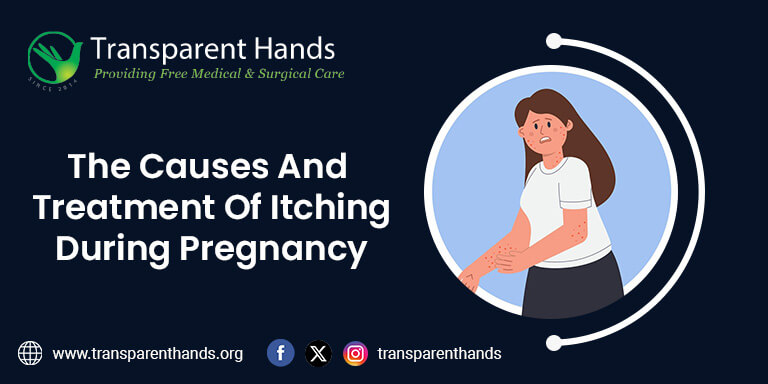The Causes and Treatment of Itching During Pregnancy

Pregnancy, that beautiful journey into motherhood, isn’t always a smooth ride. Amid the joy and anticipation, discomforts can surface, and one common visitor is itching. While itching during pregnancy is normal, too much of it it can also be a cause for concern. In this blog, we’ll dive into the causes and treatments of itching, shedding light on a condition known as cholestasis of pregnancy.
The Causes and Symptoms of Pruritus- Itching During Pregnancy
Pruritus in pregnancy, the medical term for itching, comes with various causes during the gestational period. Let’s explore some common triggers.
Stretching Skin: Your body is undergoing significant changes to accommodate your growing baby, and the stretching of the skin, especially in the abdominal area, can lead to itchiness. A bit of moisturizer might do wonders.
Hormonal Changes: Pregnancy hormones, those not-so-silent elements of change, particularly estrogen, can make your skin more sensitive, contributing to itching.
Symptoms of Hormonal Imbalance in Females
Allergies: Some moms-to-be develop sensitivities or allergies during pregnancy, triggered by new laundry detergents, body lotions, or other products.
Prurigo of Pregnancy: A mysterious condition causing tiny, itchy bumps during pregnancy, not entirely understood but linked to the magical journey of motherhood.
Eczema: If you have battled eczema before pregnancy, hormonal changes can turn up the intensity of the condition, leading to unwelcome itching.
PUPPP (Pruritic Urticarial Papules and Plaques of Pregnancy): An itchy rash that often starts with stretch marks on the abdomen and can spread elsewhere. Uncomfortable, yes, but generally harmless.
Scabies: Rare but intense, scabies, a skin infestation by tiny mites, can cause itching that demands attention.
How to Get Relief from Itching During Pregnancy?
Treatment for Itching During Pregnancy
Itching during pregnancy can be as mild to cause only mild discomfort or severe enough to keep you up at night. The good news? There are multiple safe and effective ways to get relief from itching during pregnancy. Explore the treatment of itching during pregnancy.
Hydration: Keep that water intake high. Staying well-hydrated maintains the elasticity of your skin, reducing the itch.
Avoid Hot Showers: While a steaming shower might seem tempting, opt for lukewarm water. Hot water can strip your skin of its natural oils.
Fragrance-Free Moisturizers: Pamper your skin with hypoallergenic and fragrance-free moisturizers.
Loose Clothing: Give your skin room to breathe. Loose-fitting, breathable fabrics can minimize irritation.
Anti-Itch Creams: Seek recommendations from your healthcare provider for safe anti-itch creams during pregnancy.
Now, let’s get into the nitty gritty and more complex and potentially concerning causes of itching during pregnancy.
What is the Cholestasis of Pregnancy?
Enter cholestasis of pregnancy, a rare but serious itching condition. It usually shows up in the third trimester bringing with it intense itching, especially on the hands and feet, disrupting the joy of pregnancy.
This condition taps into liver health and the flow of bile. In cholestasis of pregnancy, the normal flow of bile takes an unexpected detour, leading to a buildup of bile salts in the bloodstream. The result? An itch fiesta, with bile salts irritating the skin.
Cholestasis of Pregnancy Symptoms
– Intense Itching: Severe and potentially debilitating itching.
– Hands and Feet: The palms of the hands and soles of the feet are the most affected body parts
– No Rash: This itch comes solo, without the accompaniment of a rash.
– No Relief: Normal itch remedies might not work in offering relief.
The Normal Pregnancy Itching:
– Mild to Moderate: The itching, aside from cholestasis, usually stays within the bounds of mild to moderate.
– Widespread: Affects various parts of the body, from the abdomen to breasts and thighs.
– Accompanied by Changes: Normal itching might come with visible changes, like the appearance of stretch marks.
– Responsive to Remedies: Your everyday itch solutions often work like magic.
If you find yourself scratching away the joy of pregnancy, particularly on the hands and feet, speak with your healthcare provider to rule out cholestasis.
Nighttime itching can turn peaceful slumber into a battleground. Here are a few tips to keep comfortable during the night:
– Keep your room cool and well-ventilated.
– Embrace lightweight, breathable bedding.
– Pamper your skin with moisturizers before bedtime.
– Introduce an air humidifier to keep your skin hydrated.
If the nighttime itch persists, your healthcare provider can offer further insights and treatments that work well with your pregnancy.
Conclusion
Itching during pregnancy, from the everyday kind to the more ominous cholestasis, demands attention. Pay heed to the whispers and roars of your body, and don’t hesitate to share any symptom, even if mild, with your healthcare provider.
Most of the time, relief lies in ample hydration, a dollop of moisturizer, and a tweak in routine. Don’t brave the itch storm alone; let your healthcare provider be the co-captain, ensuring both your comfort and the well-being of your precious baby. Embrace the journey, bumps, itches, and all, and let the joy of pregnancy be the melody that drowns out the occasional itch.
(The information in this article should not be taken as a substitute for professional medical advice.)










Leave a Reply